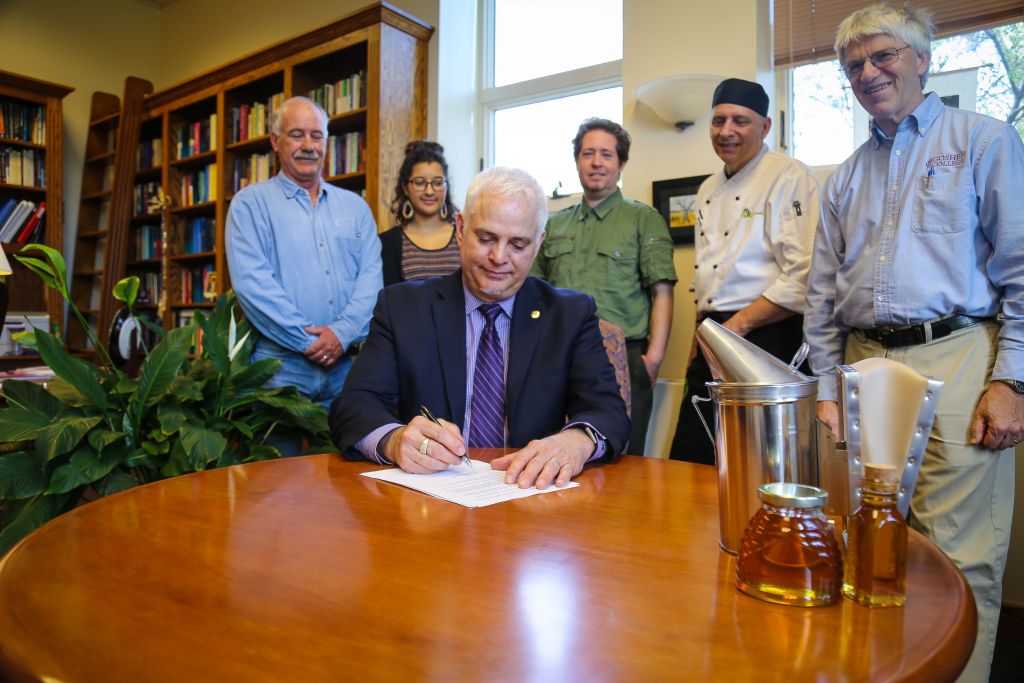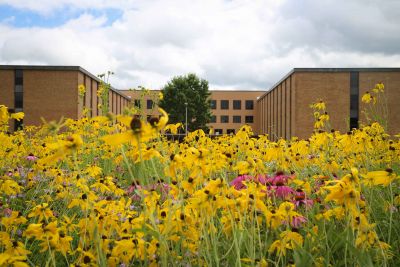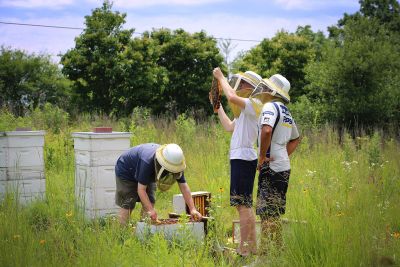Goshen College is Indiana’s first Bee Campus USA

Goshen College has been named Indiana’s first Bee Campus USA and is just the second college in the Midwest and 27th nationally to be recognized for its work in supporting pollinators such as bees.
The Bee Campus USA title recognizes colleges and universities that commit to a set of practices that support pollinators, including bees, butterflies, birds, bats and thousands of other species.
“I’m happy that one of my last acts as president at Goshen College is to sign the application for Goshen College to become a Bee Campus USA,” said President Jim Brenneman. “Goshen College appreciates the pollinators on our campus and embraces pollinator-friendly policies.”

With 12 acres of restored prairie making up 20 percent of campus lawn and managed without the use of irrigation, pesticides or herbicides, the college provides a rich habitat with nectar and pollen for honeybees and other pollinators. The college is also home to several beehives on campus and at its Merry Lea Environmental Learning Center.
“Sometimes we think the Goshen College campus is only occupied by the people, but we share this space with many forms of life,” said Glenn Gilbert, utilities manager and sustainability coordinator. “The more we can do to be in harmony with the plants and animals here, the better off we all are.”
Andy Ammons, associate professor of biology, teaches a class titled “Pollinators in Peril,” in which students learn about the importance of pollinators to the environment and to humans who depend on them for food. Students are directly engaged in the prairies and beehives on campus, as well as harvesting honey.

“It’s important to appreciate what pollinators do for us,” Ammons said. “One-third of all the food you and I eat comes from plants that have been pollinated. If we keep threatening these pollinators like bees and butterflies, we’re creating risks to our own food security. Our food, especially our most nutritious food, is most at risk when pollinators are at risk.”
As part of the Bee Campus USA application, Goshen College has organized a bee campus committee made up of students, faculty and staff who have expressed an interest in keeping GC pollinator friendly.
“I think there’s interest on campus about bees and the great ecological service they provide,” said Reena Ramos, a senior environmental science major from Auburn, Indiana. “A lot of students understand the importance of pollinator species and their importance for our future and food security.”
Students from the Bee Committee worked with AVI Fresh, the campus dining service, to create a Pollinator and Dandelion Day at the Westlawn Dining Hall on campus in April. Students collected dandelion leaves and flowers for the dining hall to be made into a pollinator salad and dandelion cookies.
“AVI is glad to partner with the college to help pollinators,” said Jeremy Corson, AVI Fresh resident director and head chef. “As a person who keeps bees, this is a great step for our community.”
President Brenneman hopes that one day, the City of Goshen will be able to follow suit as the first Bee City USA in Indiana.
“We’d love for the city to join this movement,” he said.
The Bee Campus USA program requires educational institutions to make seven commitments:
- Establish/maintain a Bee Campus USA Committee or Subcommittee.
- Host an annual campus event(s) to raise awareness of the importance of pollinators.
- Annually sponsor and track student service-learning projects to enhance pollinator habitats on-and off-campus.
- At least biennially offer a course and/or workshop on Pollinator Ecology and/or Integrated Pest Management and/or Landscaping for Pollinators.
- Post signage regarding pollinators to educate the campus and broader community about pollinator-friendly landscaping principles.
- Maintain a Bee Campus webpage on the institution’s website.
- Annually apply for renewal of the institution’s designation.
About Bee City USA
Bee City USA® urges municipalities, individuals, organizations, corporations, and communities to promote and establish pollinator–friendly landscapes that are free of pesticides. Since its inception in Asheville, North Carolina in 2012, five more cities and been certified and about fifty more are in the process of preparing applications. For more information about the application process for becoming a Bee City USA community, visit beecityusa.org.




